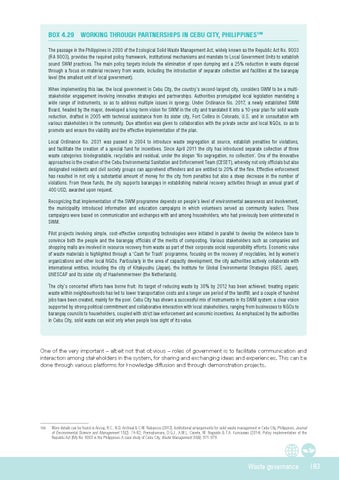BOX 4.29 WORKING THROUGH PARTNERSHIPS IN CEBU CITY, PHILIPPINES180 The passage in the Philippines in 2000 of the Ecological Solid Waste Management Act, widely known as the Republic Act No. 9003 (RA 9003), provides the required policy framework, institutional mechanisms and mandate to Local Government Units to establish sound SWM practices. The main policy targets include the elimination of open dumping and a 25% reduction in waste disposal through a focus on material recovery from waste, including the introduction of separate collection and facilities at the barangay level (the smallest unit of local government). When implementing this law, the local government in Cebu City, the country’s second-largest city, considers SWM to be a multistakeholder engagement involving innovative strategies and partnerships. Authorities promulgated local legislation mandating a wide range of instruments, so as to address multiple issues in synergy. Under Ordinance No. 2017, a newly established SWM Board, headed by the mayor, developed a long-term vision for SWM in the city and translated it into a 10-year plan for solid waste reduction, drafted in 2005 with technical assistance from its sister city, Fort Collins in Colorado, U.S. and in consultation with various stakeholders in the community. Due attention was given to collaboration with the private sector and local NGOs, so as to promote and ensure the viability and the effective implementation of the plan. Local Ordinance No. 2031 was passed in 2004 to introduce waste segregation at source, establish penalties for violations, and facilitate the creation of a special fund for incentives. Since April 2011 the city has introduced separate collection of three waste categories: biodegradable, recyclable and residual, under the slogan ‘No segregation, no collection’. One of the innovative approaches is the creation of the Cebu Environmental Sanitation and Enforcement Team (CESET), whereby not only officials but also designated residents and civil society groups can apprehend offenders and are entitled to 20% of the fine. Effective enforcement has resulted in not only a substantial amount of money for the city from penalties but also a steep decrease in the number of violations. From these funds, the city supports barangays in establishing material recovery activities through an annual grant of 400 USD, awarded upon request. Recognizing that implementation of the SWM programme depends on people’s level of environmental awareness and involvement, the municipality introduced information and education campaigns in which volunteers served as community leaders. These campaigns were based on communication and exchanges with and among householders, who had previously been uninterested in SWM. Pilot projects involving simple, cost-effective composting technologies were initiated in parallel to develop the evidence base to convince both the people and the barangay officials of the merits of composting. Various stakeholders such as companies and shopping malls are involved in resource recovery from waste as part of their corporate social responsibility efforts. Economic value of waste materials is highlighted through a ‘Cash for Trash’ programme, focusing on the recovery of recyclables, led by women’s organizations and other local NGOs. Particularly in the area of capacity development, the city authorities actively collaborate with international entities, including the city of Kitakyushu (Japan), the Institute for Global Environmental Strategies (IGES, Japan), UNESCAP and its sister city of Haarlemmermeer (the Netherlands). The city’s concerted efforts have borne fruit: its target of reducing waste by 30% by 2012 has been achieved; treating organic waste within neighbourhoods has led to lower transportation costs and a longer use period of the landfill; and a couple of hundred jobs have been created, mainly for the poor. Cebu City has shown a successful mix of instruments in its SWM system: a clear vision supported by strong political commitment and collaborative interaction with local stakeholders, ranging from businesses to NGOs to barangay councils to householders, coupled with strict law enforcement and economic incentives. As emphasized by the authorities in Cebu City, solid waste can exist only when people lose sight of its value.
One of the very important – albeit not that obvious – roles of government is to facilitate communication and interaction among stakeholders in the system, for sharing and exchanging ideas and experiences. This can be done through various platforms for knowledge diffusion and through demonstration projects.
180
More details can be found in Ancog, R.C., N.D. Archival & C.M. Rebancos (2012). Institutional arrangements for solid waste management in Cebu City, Philippines, Journal of Environmental Science and Management 15(2): 74-82; Premakumara, D.G.J., A.M.L. Canete, M. Nagaishi & T.A. Kurniawan (2014). Policy implementation of the Republic Act (RA) No. 9003 in the Philippines: A case study of Cebu City, Waste Management 34(6): 971-979.
Waste governance
183
